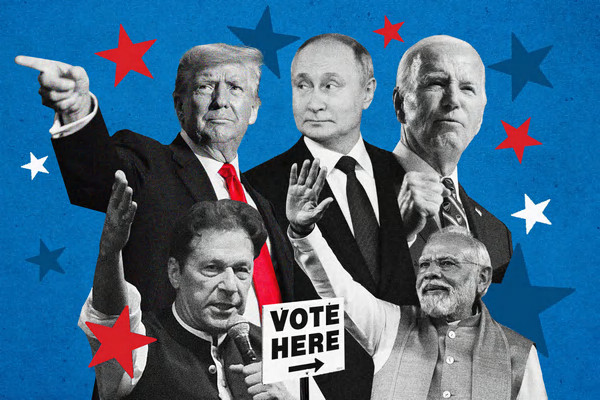Euractiv.com with AFP
Jul 5, 2024

Hungarian Prime Minister Viktor Orban (L) and Russian President Vladimir Putin (R) leave after a press conference following their bilateral talks at the Kremlin in Moscow, Russia, 5 July 2024. [EPA-EFE/YURI KOCHETKOV]
Russian President Vladimir Putin told Viktor Orbán on Friday (5 July) that Ukraine must effectively capitulate if it wants peace, in a visit to Moscow by the Hungarian leader that angered the EU, US and Kyiv.
Putin was hosting Orbán — the friendliest leader in the EU to Moscow — for talks at the Kremlin, described by the Russian president as a “really useful, frank conversation” on the conflict in Ukraine.
A string of EU officials blasted the Hungarian prime minister’s surprise trip, saying it threatened to undermine the 27-member bloc’s stance on the conflict and stressed that he was not representing Brussels.

Hungary’s Orbán travels to Moscow, days after Kyiv trip
Hungary’s Prime Minister Viktor Orbán travelled to Moscow on Thursday (4 July) to meet Russian President Vladimir Putin, only a few days after his visit to Kyiv, on a trip that earned him stern rebukes from EU officials and diplomats.
The pair “talked about the possible ways of resolving” the Ukraine conflict, Putin said in remarks after a bilateral meeting.
The Kremlin leader repeated his demand that Ukraine withdraw all its troops from regions that Moscow has annexed and said Kyiv was “not ready to drop the idea of waging war until a victorious end”.
Putin said at the start of the talks that he wanted to “discuss the nuances that have developed” over the conflict in Ukraine with Orbán, who visited Kyiv earlier this week.
Orbán in turn said he had realised “positions are far apart” between the two sides.
“The number of steps needed to end the war and bring about peace is many,” he said.
The visit came days after Hungary took over the EU’s rotating presidency and Putin told Orbán he expected him to outline “the position of European partners” on Ukraine.
The Ukrainian government lambasted the meeting, stressing they had no hand in its planning.
“The decision to make this trip was made by the Hungarian side without any agreement or coordination with Ukraine,” Kyiv’s foreign ministry said in a statement.
No EU mandate
European Union leaders lashed out at Orbán over the trip.
“Appeasement will not stop Putin,” European Commission head Ursula von der Leyen wrote on X.
“Only unity and determination will pave the path to a comprehensive, just and lasting peace in Ukraine.”
EU foreign policy chief Josep Borrell said in a statement that Orbán’s “visit to Moscow takes place, exclusively, in the framework of the bilateral relations between Hungary and Russia”.
“Orbán has not received any mandate from the EU Council to visit Moscow,” he added.
The EU has firmly opposed Russia’s military offensive in Ukraine, imposing 14 rounds of unprecedented sanctions on Moscow.
“That position excludes official contacts between the EU and President Putin. The Hungarian Prime Minister is thus not representing the EU in any form,” Borrell said.
“It is worth recalling that President Putin has been indicted by the International Criminal Court and an arrest warrant released for his role in relation to the forced deportation of children from Ukraine to Russia.”
EU Council chief Charles Michel had earlier reiterated the common stance that “no discussions about Ukraine can take place without Ukraine”.
The White House also criticised the trip as “counterproductive” and the NATO military alliance, of which Hungary is a member, distanced itself.
Orbán’s visit “will not advance the cause of peace and is counterproductive to promoting Ukraine’s sovereignty, territorial integrity and independence,” White House press secretary Karine Jean-Pierre said.
NATO head Jens Stoltenberg said Orbán had informed the alliance of his trip but stressed the Hungarian leader was “not representing NATO at these meetings. He’s representing his own country”.
Kremlin spokesman Dmitry Peskov told Russian state TV the visit had been Orbán’s idea and Russian officials only heard about the trip on Wednesday — a day after Orbán had visited Kyiv.
IN EU ranks, the condemnation of Orbán wasn’t unanimous. Slovak Prime Minister Robert Fico, who appeared in public on Friday for the first time since a May assassination attempt, backed Orbán’s visit to Moscow, saying that he would have joined his Hungarian colleague on his visit if health allowed.

Slovak PM Fico makes first public appearance since assassination attempt
Slovak Prime Minister Robert Fico appeared in public on Friday (5 July) for the first time since a May assassination attempt, railing in a speech against progressive ideologies and backing Hungarian leader Viktor Orbán’s visit to Moscow.
‘Disturbing news’
Hungary’s six-month EU presidency gives the central European country sway over the bloc’s agenda and priorities for the next six months.
Orbán’s visit to Moscow comes days after the right-wing nationalist made a surprise trip to Kyiv, where he urged Ukraine’s leadership to work towards a rapid ceasefire with Russia.
The Hungarian leader on Friday insisted that peace cannot be achieved without dialogue.
“If we just sit in Brussels, we won’t be able to get any closer to peace. Action must be taken,” Orbán said during his regular interview on Hungarian state radio, when asked about his visit to Ukraine on Tuesday.
Polish Prime Minister Donald Tusk expressed disbelief at Orbán’s Moscow trip, while Finnish Prime Minister Petteri Orpo called it “disturbing news”.
The visit is the first to Moscow by a European leader since a trip by Austrian Chancellor Karl Nehammer in April 2022.
Orbán and Putin last met in October 2023 in Beijing, where they discussed energy cooperation.
(Edited by Georgi Gotev)
Kyiv, allies slam Orban for Ukraine talks with Putin
Kyiv and its Western allies hit out at Hungarian leader Viktor Orban on Friday after Russian President Vladimir Putin hosted him in Moscow for talks on the Ukraine conflict.
Putin told Orban, Russia’s closest EU ally, that Ukraine must withdraw its troops from regions that Moscow has annexed if it wants peace.
But Kyiv was “not ready to drop the idea of waging war until a victorious end”, he added, calling the talks at the Kremlin a “really useful, frank conversation” on the conflict.
EU officials, the United States and NATO blasted the Hungarian prime minister’s surprise trip.
Slovakia’s Prime Minister Robert Fico offered a rare voice of support, saying he would have joined Orban had his health permitted after surviving an assassination attempt in May.
The Russian and Hungarian leaders “talked about the possible ways of resolving” the Ukraine conflict, Putin said in remarks after a bilateral meeting.
Orban, who visited Kyiv earlier this week, in turn said “positions are far apart” between the two sides with “many” steps needed to achieve peace.
The visit came days after Hungary took over the EU’s rotating presidency and Putin told Orban he expected him to outline “the position of European partners” on Ukraine.
The Ukrainian foreign ministry lambasted the meeting, stressing that the trip “was made by the Hungarian side without any agreement or coordination with Ukraine”.
– No EU mandate –
European Union leaders also lashed out at Orban over the trip.
“Appeasement will not stop Putin,” European Commission head Ursula von der Leyen wrote on X.
“Only unity and determination will pave the path to a comprehensive, just and lasting peace in Ukraine.”
EU foreign policy chief Josep Borrell said in a statement that Orban’s “visit to Moscow takes place, exclusively, in the framework of the bilateral relations between Hungary and Russia”.
“Orban has not received any mandate from the EU Council to visit Moscow,” he added.
The EU has firmly opposed Russia’s military offensive in Ukraine, imposing 14 rounds of unprecedented sanctions on Moscow.
“That position excludes official contacts between the EU and President Putin. The Hungarian Prime Minister is thus not representing the EU in any form,” Borrell said.
“It is worth recalling that President Putin has been indicted by the International Criminal Court and an arrest warrant released for his role in relation to the forced deportation of children from Ukraine to Russia.”
EU Council chief Charles Michel had earlier reiterated the common stance that “no discussions about Ukraine can take place without Ukraine”.
The White House also criticised the trip as “counterproductive” and the NATO military alliance, of which Hungary is a member, distanced itself.
Orban’s visit “will not advance the cause of peace and is counterproductive to promoting Ukraine’s sovereignty, territorial integrity and independence,” White House press secretary Karine Jean-Pierre said.
NATO head Jens Stoltenberg said Orban had informed the alliance of his trip but stressed the Hungarian leader was “not representing NATO at these meetings. He’s representing his own country”.
Polish Prime Minister Donald Tusk expressed disbelief at Orban’s Moscow trip, while Finnish Prime Minister Petteri Orpo called it “disturbing news”.
But Slovak leader Fico, whose country has like Hungary refused to send military aid to Ukraine, expressed his “admiration” for Orban’s trips to Moscow and Kyiv.
“There are never enough peace talks and initiatives,” Fico said in his first public appearance since a May 15 assassination attempt.
– Orban demands ‘action’ –
Kremlin spokesman Dmitry Peskov told Russian state TV the visit had been Orban’s idea and Russian officials only heard about the trip on Wednesday — a day after Orban had visited Kyiv.
Hungary’s six-month EU presidency gives the central European country sway over the bloc’s agenda and priorities for the next six months.
Orban’s visit to Moscow comes days after the right-wing nationalist made a surprise trip to Kyiv, where he urged Ukraine’s leadership to work towards a rapid ceasefire with Russia.
The Hungarian leader on Friday insisted that peace cannot be achieved without dialogue.
“If we just sit in Brussels, we won’t be able to get any closer to peace. Action must be taken,” Orban said during his regular interview on Hungarian state radio, when asked about his visit to Ukraine on Tuesday.
The visit is the first to Moscow by a European leader since a trip by Austrian Chancellor Karl Nehammer in April 2022.
Orban and Putin last met in October 2023 in Beijing, where they discussed energy cooperation.
Slovak PM says would have joined Orban on Moscow trip if healthy
Slovak Prime Minister Robert Fico said Friday he would have joined his Hungarian counterpart Viktor Orban on his controversial trip to Moscow if his health had permitted after he was shot in May.
Orban angered western EU and NATO allies when he travelled to Moscow on Friday to meet Russian President Vladimir Putin, whose country invaded neighbouring Ukraine in February 2022.
Orban visited Kyiv and Ukrainian President Volodymyr Zelensky earlier this week, just after his country had taken over the rotating six-month presidency of the European Union.
“I want to express my admiration to the Hungarian premier for travelling to Kyiv and Moscow without hesitating,” Fico said in a speech.
“If my state of health allowed me to go, I would have loved to join him.”
It was his first public appearance since the assassination attempt on May 15.
Fico delivered his speech standing, though he appeared to have lost weight and his voice sounded weaker than before the attack.
Both Hungary and Slovakia have refused to provide military aid to Ukraine under Orban and Fico, who are seen as Russia’s closest allies in the European Union.
Orban said he was on a mission to help end the war as both he and Fico are advocating peace talks with Russia.
“There are never enough peace talks and initiatives,” Fico said on Friday.
The 59-year-old Fico is recovering from serious injuries he suffered when a gunman shot him four times from close range after a government meeting in central Slovakia.
The gunman, identified by Slovak media as 71-year-old poet Juraj Cintula, is being prosecuted on terrorism charges. He is in custody awaiting trial.
Fico leads a three-party governing coalition of his centrist nationalist Smer-SD party, the centrist Hlas and the far-right SNS.
He underwent two lengthy surgeries in hospital and was transferred for home treatment to the capital Bratislava on May 31.
On Friday, he made his first appearance at a ceremony marking the arrival of St Cyril and Methodius in former Great Moravia in 863 to spread Christianity among the Slavic people.
His speech at Devin castle near the capital Bratislava lasted more than 15 minutes and was greeted by a standing ovation.
By Alexandra Brzozowski and Magnus Lund Nielsen | Euractiv
Alexandra Brzozowski
Global Europe & Defence Editor
Location: Brussels
Jul 5, 2024

“Every day there will be some news and our expectation is that very quickly [Patriots for Europe] is going to be the third largest party,”
Euractiv is part of the Trust Project >>>
The new Patriots for Europe group looks set to become the third largest political force in the European Parliament, joining Spain’s VOX party, which is leaving the European Conservatives and Reformists (ECR), and with Marine Le Pen’s party, Rassemblement National (RN), who are also likely to join too.
Since the European Elections in early June, the parliament’s groups have been scrambling to win over members of the European Parliament (MEPs) ahead of the upcoming mandate.
“Every day there will be some news, but our expectations are, that very quickly [Patriots for Europe] is going to be the third largest party,” Balázs Orbán, close advisor to Viktor Orbán, told Euractiv. His comments come after the announcement of a new group caused much commotion on the right side of the hemicycle last week.
Austria’s far-right leader, Herbert Kickl (FPÖ), Hungarian Prime Minister Viktor Orbán (Fidesz), and former Czech leader Andrej Babiš (ANO) revealed a new political alliance called ‘Patriots for Europe’, on Sunday 30 June.
Spanish party VOX, currently part of ECR, decided to leave Giorgia Meloni’s political family and join the new formation, they announced, on Friday 5 July.
With this move, the new group totals 29 MEPs from four member states, but are still missing three additional member states to form an official political group in the European Parliament.
According to people close to the negotiations, the ID group of Marine Le Pen is expected to merge with the Patriots within the coming days. This would push the combined total to as many as 86 MEPs, should all the members of the ID choose to join.
If the merger goes ahead, the new group would become the third largest force in the parliament.
It would put the Patriots ahead of both ECR, now at 78 MEPs, and the liberal Renew Europe group, currently at 76 MEPs.
“Le Pen, Orbán, and other delegations reached a deal before last Sunday that ID would cease to exist to create the new one,” a well-informed MEP confirmed to Euractiv, pointing out that the package of high-level jobs among the various delegations, was decided as part of the deal.
Following the French elections results on Sunday evening, new developments are expected on Monday 8 July, before European parliamentary leaders meet to negotiate and agree on the final leadership positions.
Asked whether he expects Le Pen to join the new grouping, Orbán said: “It’s their decision and they will make the decision after [Sunday’s] election.”
*Max Griera contributed to reporting
[Edited by Aurélie Pugnet/Rajnish Singh]







 SOCIALIST STANDARD
SOCIALIST STANDARD